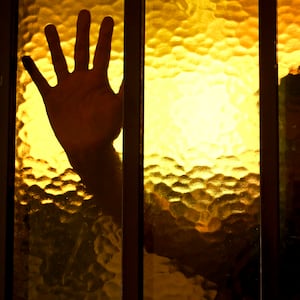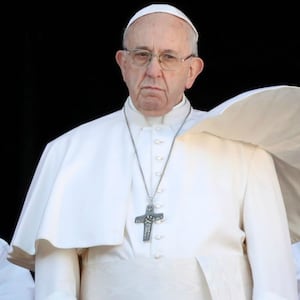ROME—When 53-year-old Gustavo Óscar Zanchetta abruptly left his post as bishop of Orán in Argentina in July 2017, he cited “health reasons” and a need for “treatment.” Many were concerned that he might have a terminal disease, according to local press reports at the time. After all, the popular bishop didn’t even seem well enough to hold a farewell mass.
Zanchetta tendered his resignation to Pope Francis, who often sits on such matters for months. Instead, the pope granted it within three days, according to the Associated Press, which broke the story, and soon Zanchetta was on his way to Rome, first spending time at an undisclosed location in Spain.
Now safely in Vatican City where he enjoys diplomatic immunity, the bishop stands credibly accused of sexually harassing young seminarians in the home country he shares with Francis.
ADVERTISEMENT
Not long after resigning, Zanchetta showed up on Pope Francis’ doorstep in Rome, apparently miraculously cured. Francis, who had made his fellow countryman a bishop right after becoming pope in 2013, naturally helped him out. Francis, back when he was Cardinal Jorge Bergoglio and archbishop of Argentina, apparently knew Zanchetta well. He gave the younger man a high-ranking position in the Argentinean Bishops Conference when he was president of the organization. It made sense that he would find a place for a fellow Argentine in the Curia in Rome.
By December, Francis had created a position for Zanchetta in the Administration of the Patrimony of the Apostolic See, known as APSA, according to the Vatican’s own press statements from the time. The office oversees more than 5,000 lavish properties under the Vatican’s Secretariat of the Economy, run by George Pell, now on a leave of absence to fight historical sex-abuse charges in his home country of Australia.
But all the while Zanchetta was settling into his new role in Rome, the rumor mill was churning back home in Argentina. There was speculation by El Tribuno newspaper in Salta, Argentina, that he had a drug problem after he allegedly refused to allow police to search his vehicle during a routine traffic stop, citing his role as a high-ranking bishop as the reason he did not have to succumb to the search.
Then rumors started to swirl that Zanchetta had paid off three whistle-blowing priests who had apparently reported him to the local papal nuncio, or Vatican representative, in Argentina.
If true, it would have meant that the nuncio would have alerted members of the Roman Curia in Rome. Then one of two things would have happened. As an Argentinean that Francis made a bishop, the pope was either informed of the trouble on his home turf, or protected from it.
The charges laid out in the Argentinean press include mismanagement of diocese funds to buy the silence of several young seminarians between the ages of 20 and 25 that Zanchetta had allegedly sexually harassed and tried to convince to enter into a sexual relationship. El Tribuno cites “masturbation, groping and psychological pressure” brought on by the powerful bishop against the priests in training. One report outlines lavish gifts used to buy the silence of the young seminarians.
When the rumors started to take shape, authorities in Argentina launched an official inquiry into allegations of clerical sex abuse that were first reported by El Tribuno paper, according to a statement sent to all accredited journalists with the Holy See, by the Vatican’s new spokesman, Alessandro Gisotti, on the job less than a week after the resignation of American former Fox newsman Greg Burke, who resigned as spokesman on December 31.
“Bishop Zanchetta was not removed from the diocese of Orán,” the statement begins. “He was the one who resigned. The reason for his resignation is linked to his difficulty in managing relations with the diocesan clergy and in very tense relations with the priests of the diocese.”
Gisotti goes on to say: “At the time of his resignation there had been accusations of authoritarianism against him, but there had been no accusation of sexual abuse against him. The problem that emerged then was linked to the inability to govern the clergy.”
“No charges of sexual abuse had emerged at the time of appointment to [APSA]. The accusations of sexual abuse date back to last fall.”
Gisotti adds that the Congregation for Bishops is now conducting its own internal Vatican investigation into the matter. “If the elements to proceed are confirmed, the case will be referred to the special commission for the bishops,” Gisotti concludes, making no reference to the secular criminal case in Argentina or whether Zanchetta would be extradited if Argentina asks. “During the investigation, Msgr. Zanchetta, will abstain from work.”
The news comes at a particularly delicate moment for Francis in his increasingly uphill battle to get a handle on what has become a hemorrhaging crisis. Earlier this week, the pontiff penned a terse letter to American bishops to clean up their act and stop protecting each other.
In February, he will host a month-long meeting in Rome with church leaders from around the world who will try to somehow come up with a strategy to address the systematic problem that has truly rotted the core of the Roman Catholic Church.







